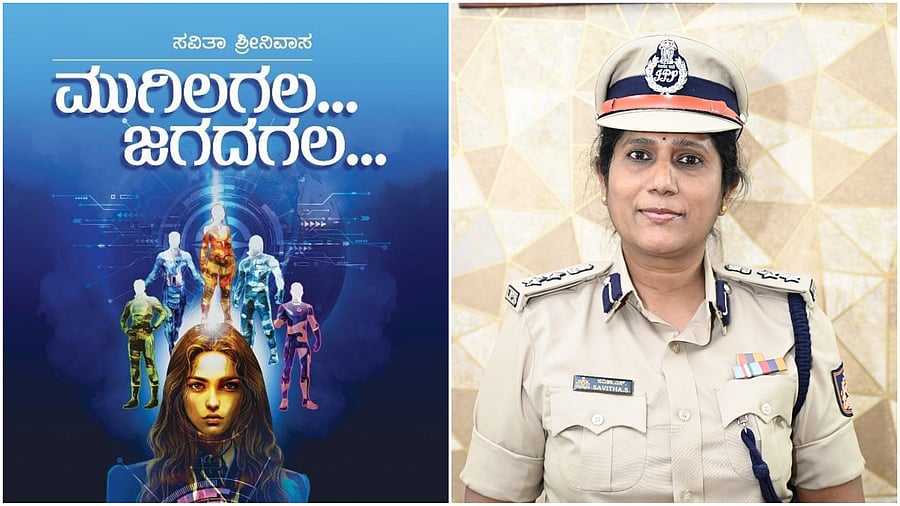
'Mugilagala… Jagadagala…' written by IPS officer Savitha Srinivas
Credit: Special Arrangement
Savitha Srinivas works as superintendent of police, Narcotics and Organised Crime Division, Cyber Command and Narcotics, and has 16 books to her credit, two of them compilations of short stories. She spoke to Deccan Herald about her passion for science fiction.
Excerpts:
What inspired you to write your latest novel?
It is about natural disasters. It sets the stage for a team of special warriors. They have special skills in each of the five elements of nature and conduct research and operations to counter the challenges. 'Mugilagala…Jagadagala…' has five chapters, each devoted to one element, viz, earth as ‘vasudatri’, water as ‘varidhatri’, fire as ‘jwaladri’, wind as ‘pavanadri’ and akash element as ‘ambaradri’. Having said this, my first science fiction novel, Triloka Sanchari Neere, published in 2019, was about humans with (artificial hand and limb) transplants playing a key role in ensuring smooth mobility. My second science fiction novel, Galakke Sikka Chandira was set on the moon where colonised humans face acclimatisation and other challenges. In fact, characters from the two novels appear in my latest novel too.
How do you place these elements in a scientific setting?
'Mugilagala Jagadagala…' dwells on the challenges faced by the elements of nature from natural disasters. It sets the stage for a team of special “warriors” who gear up to meet the challenges with new initiatives. The warriors have special skills in each element and conduct research and operations to counter the challenges.
How do you draw inspiration for writing when your hands are full with investigating crime?
Investigation and supervising an investigation demand a lot of attention. Writing was my passion even before I joined the force. Being in this position shapes the characters of my novels wherein the women-centric characters gain prominence with their leadership qualities.
How is science fiction faring in Kannada?
Shivaram Karanth and Poornachandra Tejaswi were literary figures with their own readers. Recently an institution called for papers on science writers and these writers got a lot of attention, but others got a lukewarm response. Not many critics are highlighting or reviewing science fiction in Kannada. Science fiction works of Bhoosanurmath, known as HG Wells of Kannada, stand apart. Their readers have not been tapped in by this generation of SF writers. Literary and science organisations have not evinced much interest in popularising science fiction. They need to conduct regular workshops so that new writers are groomed. It is a continuous process.
There are science fiction readers in Kannada as can be seen in translation of works like Mary Shelley’s 'Frankenstein', Karl Capek’s Rossums’ Universal Robots and of Asimov. Is there a dearth of writers, or is there a problem on the publishing side?
There are very few writers in Kannada who are presently contributing to this field as compared to Marathi and Bengali. Dr KN Ganeshaiah, Kollegala Sharma and Dr Shantala, just to name a few are prominent science fiction writers in Kannada. Huge publicity is given to Science Fiction works in other language platforms, so that the readers are drawn to their books. These concerted mechanisms of tapping into and generating interest among science readers or general public is lacking in Kannada. Book reading and launches are confined to academic Institutions and their outreach is less. A little more effort on the promotional side by literary organisations will surely boost this genre. However, some Kannada magazines publish science fiction stories and serialise science fiction novels. In Marathi, Bengali or Tamil, every special issue by media houses on occasions like Deepavali or Ugadi carry at least one or two science fiction stories.